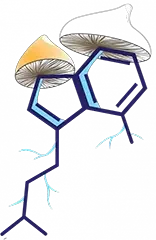Addiction represents a global issue that impacts individuals and societies alike. Its complexity often leads to difficulties in achieving sustained recovery through conventional treatments. In recent times, a growing body of research has begun to explore the potential of lysergic acid diethylamide (LSD)-assisted therapy as a new approach in addiction management. Based on the findings by Carhart-Harris and Nutt (2017), this article attempts to dissect the possible benefits of LSD-assisted therapy in overcoming addiction.
The Anatomy of Addiction and Current Therapeutic Approaches
Addiction, a chronic condition, is defined by compulsive engagement in detrimental behaviors or substance abuse. While established treatment approaches, such as behavioral therapy, counseling, and medication-assisted treatment have shown some effectiveness, they are not universal solutions. Given high relapse rates, research like that of Volkow et al. (2016) emphasizes the need for alternative treatment methods to enhance the outcomes for those struggling with addiction.
The Potential Role of LSD-Assisted Therapy in Addiction Treatment
LSD-assisted therapy employs the psychedelic properties of LSD to facilitate therapeutic breakthroughs. The psychedelic journey incited by LSD could catalyze introspection, emotional healing, and behavior change. Johnson et al. (2014) and Bogenschutz et al. (2015) presented studies that reveal significant reductions in substance abuse, cravings, and improvements in mental health through the application of psychedelics in therapeutic settings.
Examining the Research: LSD-Assisted Therapy for Addiction
Although the research on LSD-assisted therapy for addiction is nascent, preliminary studies demonstrate encouraging outcomes. Multiple clinical trials and observational studies are investigating the efficiency of LSD-assisted therapy for various types of addiction. Garcia-Romeu et al. (2019) reported a significant decrease in alcohol consumption and improved psychosocial functioning with the use of LSD-assisted therapy for alcohol use disorder. Such findings indicate the potential of LSD-assisted therapy as an effective adjunct to traditional addiction treatment.
The Mechanisms of LSD-Assisted Therapy for Addiction
Current research is focusing on understanding the underlying mechanisms of the therapeutic effects of LSD in addiction treatment. LSD potentially interacts with several brain circuits implicated in addiction, including the serotonin system and the default mode network. This interaction could improve cognitive flexibility, emotional processing, and insight, helping individuals comprehend the root causes of their addiction, leading to lasting behavior change. Research by Roseman et al. (2018) and Carhart-Harris et al. (2018) provide crucial insights into these neurobiological mechanisms.
Safety and Potential Risks: LSD-Assisted Therapy
Safety remains a key consideration in LSD-assisted therapy for addiction. Appropriate screening, preparation, and therapeutic guidance are crucial to ensure the safety of participants and enhance therapeutic outcomes. Although LSD is generally well tolerated, potential risks may include challenging experiences or the exacerbation of existing psychiatric conditions. Krebs and Johansen’s (2013) research highlights the importance of a controlled and supportive therapeutic environment to mitigate these risks.
Navigating Ethical and Regulatory Challenges
LSD-assisted therapy for addiction presents unique ethical and regulatory challenges. Ethical guidelines, comprehensive consent processes, and robust regulatory mechanisms must be in place to ensure the responsible application of psychedelics in therapy. The current legal status of LSD poses significant barriers to research and its therapeutic use. Advocacy efforts aim to facilitate regulatory changes to foster further research and expand access to LSD-assisted therapy. Moreno et al.’s (2006) work underscores the importance of a thoughtful, ethical, and responsible approach.
Implications and Future Directions
The possible implications of LSD-assisted therapy in addiction treatment are substantial. By integrating LSD-assisted therapy into existing programs or creating specialized care models, it could open new pathways for individuals grappling with addiction. Future research should aim to optimize treatment protocols, identify suitable populations, and study the long-term outcomes of LSD-assisted therapy. Collaboration between researchers, clinicians, policymakers, and regulatory bodies will be instrumental in advancing this field.
Conclusion
Early research presents LSD-assisted therapy as a promising alternative to traditional addiction treatments. Its potential effectiveness in reducing substance use, cravings, and enhancing mental health outcomes is noteworthy. However, further research is necessary alongside responsible use, and a robust ethical and regulatory framework. Innovative approaches, including LSD-assisted therapy, could significantly improve addiction treatment outcomes, offering fresh opportunities for those seeking recovery.
[gap height=”130px”]
[ux_image id=”8401″]
[gap height=”130px”]
We hope that you have gained a little more understanding and wisdom after reading through our article about LSD. We hope that it has inspired you to explore the multitude of possibilities through LSD.
Shroomhub is your trusted online source in Canada for all things Psychedelic, from Magic Mushrooms, LSD and even DMT, take advantage of our weekly deals and bargain prices you wont find anywhere else!
[gap height=”130px”]
[message_box]
[row v_align=”middle” h_align=”center”]
[col span=”9″ span__sm=”12″]
Author
Freelance Writer
Leo Thomas
[/col]
[col span=”2″ span__sm=”12″ align=”center”]
[button text=”Linkedin” color=”white” style=”outline” radius=”99″ link=”https://www.linkedin.com/in/leo-thomas-24b827279/”]
[/col]
[/row]
[/message_box]


